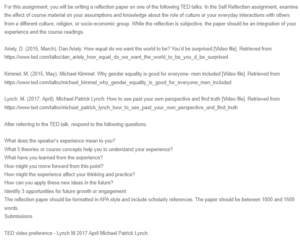Self-Reflection with Respect to Truth
This reflection paper is based on a TED video titled; ‘Lynch, M. (2017, April). Michael Patrick Lynch: How to see past your own perspective and find truth.
During Lynch’s talk, the audience was informed on how self-identity interferes with the truth value of facts and information. According to Lynch, knowledge polarization occurs so frequently that it is challenging to distinguish sets of information as true or false, and this fact is influenced by the personalization of information an individual intercepts. Subsequently, information is graded as true or false based on a couple of factors, such as its reliability, evaluation, and interpretation. Therefore, as individuals receive information, they first evaluate it, interpret it, and then determine whether it is reliable; additionally, this statement describes their perspective of the information and influences whether they believe it is a fact or not. Accordingly, Lynch advises three steps to reduce knowledge polarization: the belief in truth, daring to know more and understanding, and humility. From the talk, it is evident that Lynch addresses apparel issues in society daily.
Several theories from this course are made evident in the talk by Lynch. The first theory is identity. The talk by Lynch is titled, ‘How to see past your own perspective and find the truth’, illustrating that self-identity and perspective influence the truth value of a statement. Lynch gives examples in the talk to illustrate how people influence factual information, raising doubts about the truth factor of the information and saying that it is difficult to trace a fact because of the personalization of information. Moreover, cultural backgrounds also influence an individual’s perspective, influencing the perception of information because people interacting may have varying cultural backgrounds.
The second theory touched on in Lynch’s talk is understanding research. Lynch talks of a remedy to knowledge polarization, which he terms as daring to know more and understand. Under this remedy, Lynch advises individuals to conduct more research on given knowledge to understand the reason the information is defined as fact. Conducting research and understanding the research results will reduce cases of knowledge polarization (Kim, 2017). In most cultures, information passed down from generation to generation is defined as a fact without research to determine its truth value (Selmeski, 2015).
The third theory touched on in the talk is social privilege. The development of the internet and the availability of information on the internet depict social privilege. People can access any information from the internet at any time and on any gadget. Lynch addresses the fact that the availability of a lot of information leads to the availability of questionable information. Anyone can put any information on the internet, and people can take fake news as factual information. Cultural background, therefore, influences social privilege.
The fourth theory is multicultural competence. Multicultural competence is the ability to relate and understand another person based on their culture that influences their perspective (Stuart, 2004). Lynch addresses two remedies to knowledge polarization based on multicultural competence; belief in truth and having humility.
The fifth theory is multicultural psychology. Lynch understands the behavioral practices of individuals that lead to knowledge polarization; this understanding enables Lynch to address strategies that can be employed to help individuals overlook their perspectives when they obtain new information.
Lessons learned from the video include the impact of culture on the perception of knowledge. Understanding people’s cultures will create a way forward with intercultural interaction because culture influences perspective. Understanding cultural backgrounds, moving forward will enable the understanding of people’s perspectives on new information.
References
Lynch, M. (2017, April). Michael Patrick Lynch: How to see past your own perspective and find truth [Video file]. Retrieved from https://www.ted.com/talks/michael_patrick_lynch_how_to_see_past_your_own_perspective_and_find_truth
Kim, Y. (2017). Knowledge Versus Beliefs: How Knowledge and Beliefs Mediate The Influence of Likeminded Media use on Political Polarization and Participation. Journal Of Broadcasting & Electronic Media, 61(4), 658-681. doi: 10.1080/08838151.2017.1375497
Selmeski, B. (2015). Military Cross-Cultural Competence: core concepts and individual development. Retrieved 9 May 2021, from http://www.cultureready.org/sites/default/files/publications/Selmeski%20(2007).pdf
Stuart, R. (2004). Twelve Practical Suggestions for Achieving Multicultural Competence. Professional Psychology: Research And Practice, 35(1), 3-9. doi: 10.1037/0735-7028.35.1.3
ORDER A PLAGIARISM-FREE PAPER HERE
We’ll write everything from scratch
Question
For this assignment, you will be writing a reflection paper on one of the following TED talks. In the Self Reflection assignment, examine the effect of course material on your assumptions and knowledge about the role of culture or your everyday interactions with others from a different culture, religion, or socio-economic group. While the reflection is subjective, the paper should be an integration of your experience and the course readings.

Self-Reflection with Respect to Truth
Ariely, D. (2015, March). Dan Ariely: How equal do we want the world to be? You’d be surprised [Video file]. Retrieved from https://www.ted.com/talks/dan_ariely_how_equal_do_we_want_the_world_to_be_you_d_be_surprised
Kimmel, M. (2015, May). Michael Kimmel: Why gender equality is good for everyone- men included [Video file]. Retrieved from https://www.ted.com/talks/michael_kimmel_why_gender_equality_is_good_for_everyone_men_included
Lynch, M. (2017, April). Michael Patrick Lynch: How to see past your own perspective and find truth [Video file]. Retrieved from https://www.ted.com/talks/michael_patrick_lynch_how_to_see_past_your_own_perspective_and_find_truth
After referring to the TED talk, respond to the following questions.
What does the speaker’s experience mean to you?
What 5 theories or course concepts help you to understand your experience?
What have you learned from the experience?
How might you move forward from this point?
How might the experience affect your thinking and practice?
How can you apply these new ideas in the future?
Identify 3 opportunities for future growth or engagement.
The reflection paper should be formatted in APA style and include scholarly references. The paper should be between 1000 and 1500 words.
Submissions
TED video preference – Lynch M 2017 April Michael Patrick Lynch.

